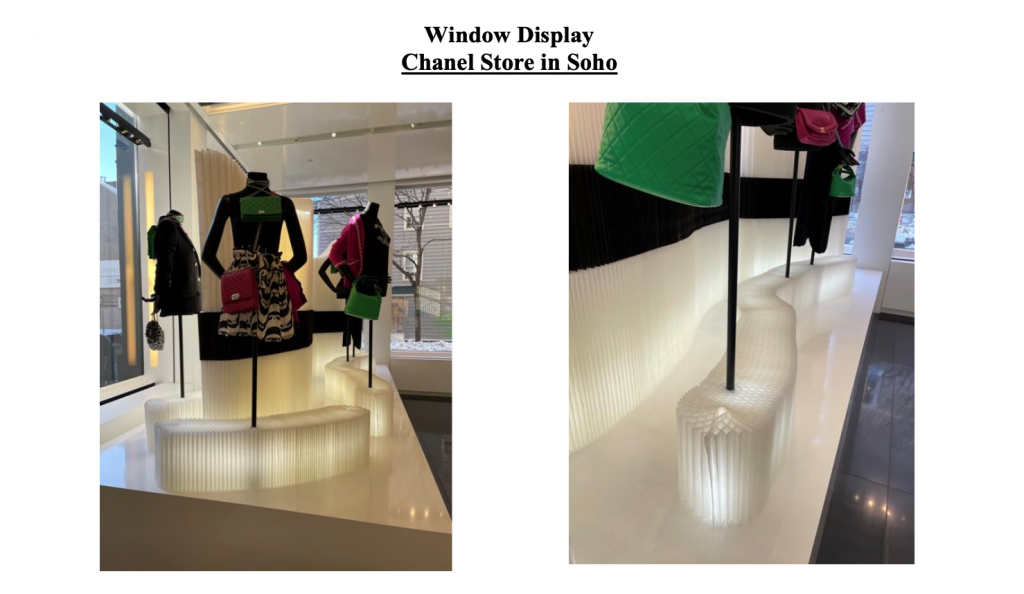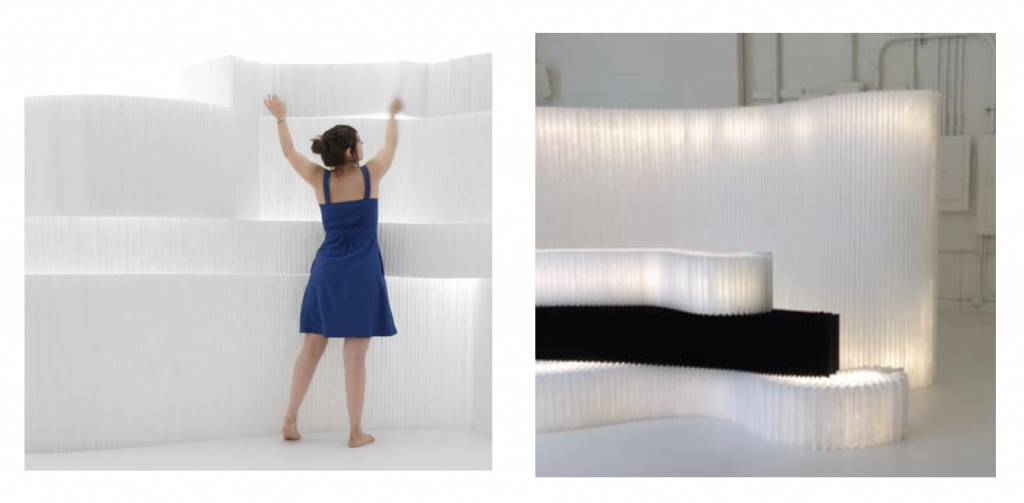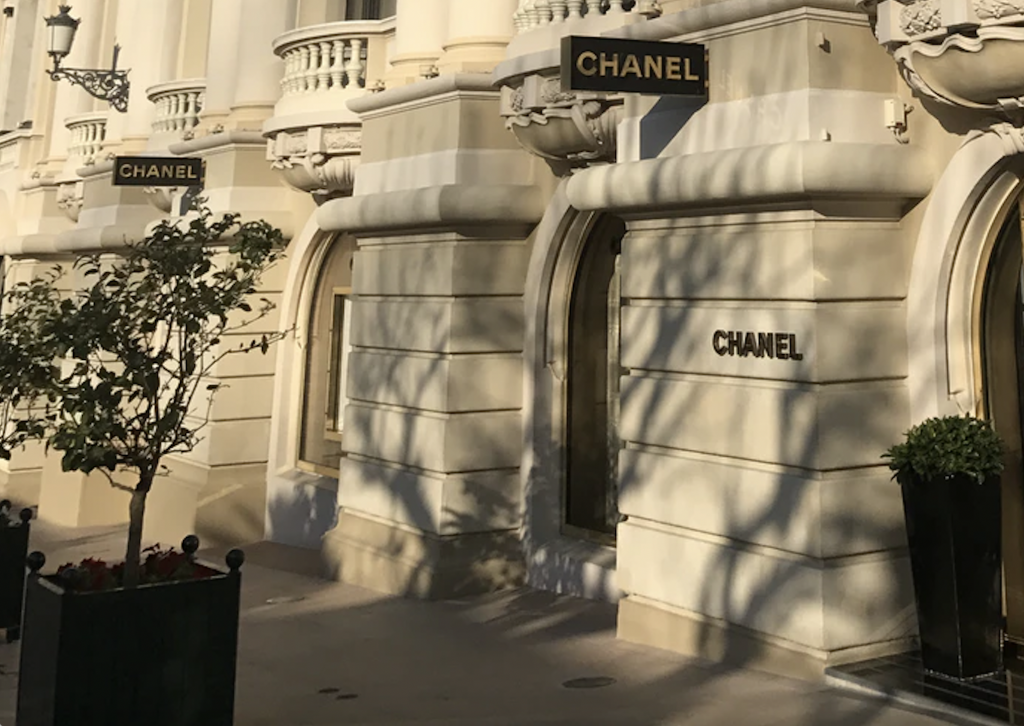The intricately-engineered blocks of accordion-assembled paper that appear in the windows of Chanel boutiques across the globe, and within the stores, themselves, have landed the luxury brand on the receiving end of a patent infringement lawsuit. According to the complaint that it filed in a New York federal court on Monday, Vancouver-based design studio Molo Design claims that after coming in contact with Chanel for a number of years, and after it ordered samples of Molo’s products, the famed fashion brand copied the patent-protected designs to decorate its stores.
Setting the stage in the newly-filed complaint, Stephanie Forsythe and Todd MacAllen-founded Molo Design claims that, among other products, it “makes award-winning flexible space partitions” – its “softwall and softblock” products – which “exemplify its exploration of experiential space making.” Hardly a little-known name, Molo asserts that “leading retailers and design companies, including Dior, Louis Vuitton, and Hermes … have purchased [its] softwall + softblock products.” Meanwhile, Bottega Veneta, LVMH-owned Le Bon Marche, Nike, Estee Lauder, Levi Strauss, and NASA, among others, also use its softwall + softblock products “in retail settings, showrooms, commercial spaces, offices and exhibitions across the world.”
As for Chanel, Molo asserts that it has had “discussions and exchanges [with the brand] since at least 2014, when a Chanel employee expressed interest in Molo’s collection, including its black textile softwall + softblock products.” Subsequently, in 2016, Molo alleges that “one of Chanel’s executive directors visited Molo at the International Contemporary Furniture Fair in New York City, [and] the following year, the same executive director ordered samples of Molo’s softwall + softblock products.”
Fast forward to October 2020, and Molo claims that Substrate Fabrication, a company that “specializes retail window displays, architectural interiors, and display rollouts,” contacted it regarding the use of its softwall + softblock products for “an upcoming retail rollout … that would involve window displays in at least 26 Chanel stores across the U.S.” In response to Substrate’s inquiry, and its confirmation that Chanel was interested in using Molo’s product, the company says that it provided Substrate with “detailed information regarding its softwall + softblock products,” as well as “technical specification, certifications, and use guides” for the products.

The potential project started to break down immediately thereafter, per Molo, which contends that a month later, New York-based Substrate informed it that the project “was on hold due to other priorities, but advised Molo to check back again in December.” When Molo did so, it says that Substrate revealed that it was “no longer working on the project.”
All the while, Molo claims that it was also contacted by InLuce, a French visual merchandising agency, about similar advertising displays for Chanel’s stores in Europe. “As it did with Substrate, Molo provided detailed information regarding its softwall + softblock products to InLuce, including technical specifications, certifications, and user guides,” the company asserts, noting that “InLuce responded by providing estimated quantities of softwall + softblock products that would be needed for the rollout, in both white and black paper.” That potential partnership similarly fell through, according to Molo, which claims that “after additional discussions, InLuce informed [it] that Chanel had pushed InLuce to use another supplier instead of Molo.”
While Molo asserts that it “specifically pointed out to InLuce that its [softwall + softblock] designs are patented,” that allegedly did not stop Chanel from installing displays in its stores with “materials that copied [its] patented softwall + softblock products,” which Molo says that it first learned about in February. The similarity between its products and those featured in Chanel’s stores was so striking, according to Molo, that “a Molo client walking by a Chanel store [in New York] thought that Molo’s softwall + softblock products were used in the Chanel window display, and congratulated Molo without knowing that the display materials are actually unsanctioned copies of Molo’s patented products.”
Since then, Molo contends that it “has been made aware of Chanel stores in other cities and countries around the world that are using products that copy Molo’s patented softwall + softblock products,” and as a result, the company says it “was shocked and hurt when it learned that infringing copies of its products had been authorized by Chanel, [which it] presumed shared the same values regarding, design, creativity and innovation.”

Setting forth claims of patent infringement, Molo asserts that the reproductions being used by Chanel infringe “one or more claims of [its] patents for its softwall + softblock products,” namely four utility patents that cover “flexible furniture systems” complete with “a core formed from a plurality of laminar panels of a flaccid material that are inter-connected to provide an expandable structure upon movement of the panels away from each other.”
“Chanel and Substrate had knowledge of Molo’s [patents],” the company argues, “and know that their use of reproduction softwalls, which are not authorized by Molo, constituted infringement” of its patents. Alternatively, Molo claims that both Chanel and Substrate “were willfully blind regarding their infringement” of the patents, making their conduct “egregious, willful, wanton, malicious, in bad faith, deliberate, consciously wrongful, flagrant, and characteristic of a pirate.” All the while, Molo alleges that “Substrate and InLuce were agents for Chanel and acted within the scope of their agency, or otherwise acted at Chanel’s direction and on Chanel’s behalf.”
And still yet, it asserts that Chanel “actively participated in, ratified, and/or adopted each of the acts alleged herein with full knowledge of all facts or circumstances, including full knowledge of [its] patents and each violation of [its] patent rights.”
As a result of the foregoing, Molo claims that it has been damaged “at least financially and in brand value by the copied material in Chanel stores in the United States and around the world,” and is seeking a finding from the court that its patents are “valid, enforceable, and have been infringed by [Chanel]” and that such infringement was willful. In addition to monetary damages to “adequately compensate” for such alleged infringement, Molo also wants “a judgment that this is an exceptional case under 35 U.S.C. § 285,” and thus, an award of attorneys’ fees, expert witness fees, costs, and all expenses incurred in this action, with interest.
A representative for Chanel was not immediately available for comment.
*The case is Molo Design, Ltd. v. Chanel, Inc., 1:21-cv-01578 (SDNY).











